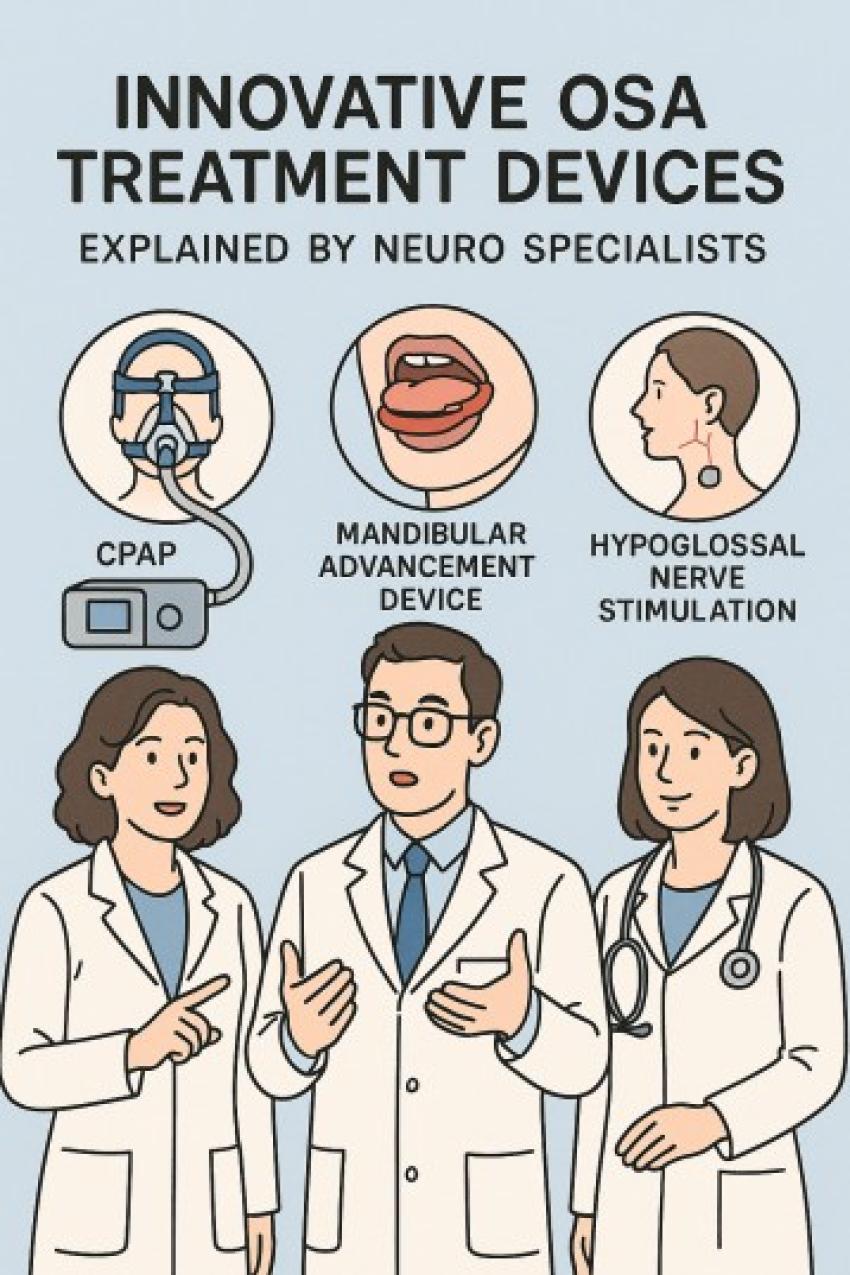
untreated obstructive sleep apnea (OSA) increases the risk of stroke, heart disease, and memory loss. That is why new treatment devices are important, and why neuro specialists are often involved in guiding care.
Innovative OSA Treatment Devices Explained by Neuro Specialists
Why new devices matter in obstructive sleep apnea treatment
Obstructive sleep apnea treatment (OSA treatment) has long depended on CPAP machines. CPAP works, but many people find it hard to use every night. Neuro specialists explain that poor adherence is one of the biggest reasons patients stay untreated. This has pushed doctors and researchers to develop new devices that are more comfortable and effective.
Oral appliances and positional devices
Dentist-made oral appliances are now an option for people with mild to moderate OSA. These devices shift the lower jaw forward so the airway stays open. Positional devices are also useful when apnea is worse during back sleep. They keep the body tilted or side-sleeping. Neuro specialists often combine these with lifestyle advice like weight management or alcohol control.
Implantable stimulation devices
One of the most advanced tools is hypoglossal nerve stimulation. A small device is implanted in the chest, with a wire that connects to the nerve controlling the tongue. When the patient sleeps, the device stimulates the nerve, moving the tongue forward and keeping the airway clear. Studies show this can lower apnea events significantly. Neuro specialists support its use for patients who cannot tolerate CPAP.
Smart CPAP and BiPAP systems
Traditional CPAP is not the same as modern CPAP. New machines use auto-adjusting pressure, heated humidifiers, and even artificial intelligence to track breathing. ResMed and similar companies now design masks and heated tubes that adapt to patient comfort. For those with central sleep apnea or neurological issues, BiPAP machines give different pressures for inhale and exhale. Neuro specialists decide when these devices are needed, especially for patients with brain or spinal conditions.
Overlap with restless legs syndrome treatment
Neuro specialists often see patients with both OSA and restless legs syndrome (RLS). Poor sleep from one condition can worsen the other. Treatment for RLS includes iron correction, dopamine-based medicines, and sleep hygiene. Addressing both OSA treatment and RLS treatment together improves total sleep quality.
The role of neuro specialists
Sleep apnea is not only about snoring. It affects the brain, oxygen levels, and heart. Neuro specialists check for headaches, memory changes, or movement disorders. Their role is to choose the right device for each patient, whether CPAP, oral appliance, implant, or a combination. They also track neurological effects of poor sleep and ensure patients do not miss related conditions.
Summary
Innovative devices are changing how obstructive sleep apnea treatment works. From oral appliances to nerve stimulators, patients now have options beyond standard CPAP. Neuro specialists are central to this progress because sleep apnea is not only a breathing problem but also a neurological and systemic issue. Managing OSA treatment along with restless legs syndrome treatment gives better outcomes.
FAQ
Q. Do all OSA patients need CPAP?
No. Some patients can use oral appliances, positional devices, or implantable stimulators. A neuro specialist or sleep doctor decides based on the severity.
Q. Can restless legs syndrome treatment improve OSA?
Not directly, but treating RLS improves sleep quality. Patients with both RLS and OSA benefit when both are managed together.
Q. Are implantable OSA devices safe?
Yes. Hypoglossal nerve stimulation devices are FDA-approved and used when CPAP fails. They require surgical placement and medical follow-up.
Q. Why involve a neuro specialist for OSA treatment?
Because sleep apnea affects brain health, headaches, memory, and sometimes overlaps with neurological diseases. Neuro specialists make sure no underlying issues are missed.




